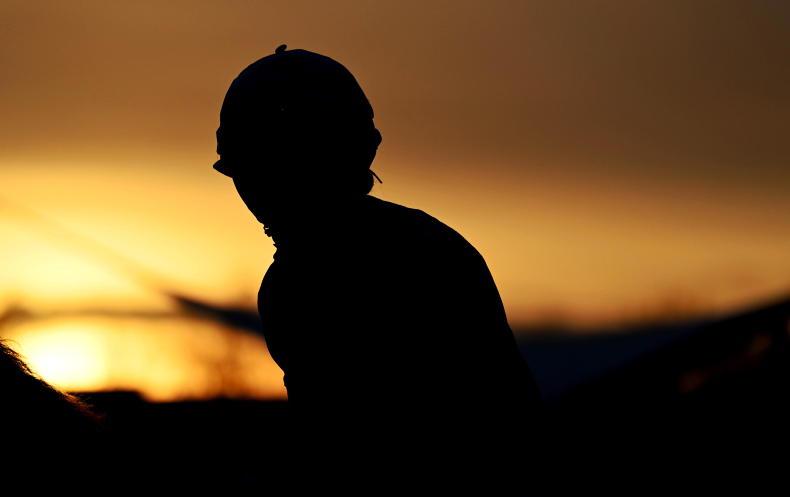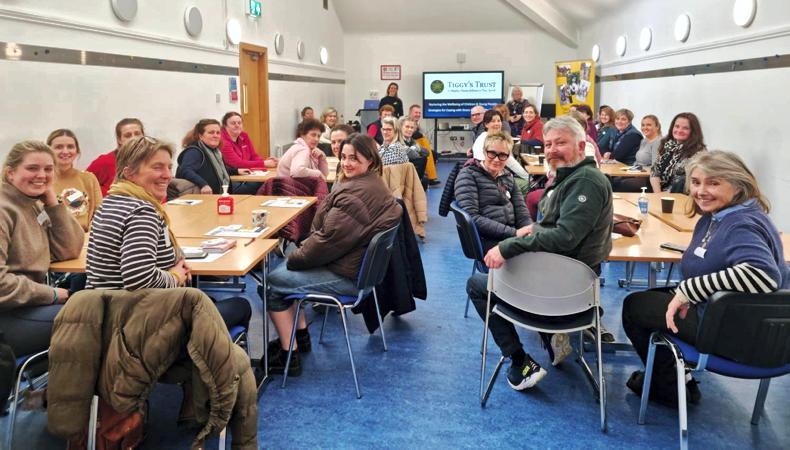OVER the past two decades, horse sport throughout the world has seen a massive amount of change for the better.
One change which has been welcomed by amateurs and professionals alike is the introduction of Performance Coaching. One such coach who specialises in equestrian sport is Kildare-based Poppy Blandford.
“For me, performance coaching is all about action. From the first session I want the client to walk away with at least one thing that is practical. So you need to be able to do something which will help with whatever you find yourself in today and then we can try to add on from there.
“I work mostly over video calls for individual sessions. At the moment, 95% of my work is international. My clients could really be split into two halves. Firstly the amateurs who tend to come to me with things like nervousness or they have had a setback with their riding and are having a hard time getting back.
“The second are the professionals who may have set goals like the Olympics or World Championships. Some people come because they have plateaued and want to find a way forward, some are doing really well and they want to make sure they can continue that way.
“I also do group sessions. The FEI asked me to lecture for the FEI Rolex Young Rider Academy and I’ve been working with them for about five years now. I work with various other groups and was delighted to be invited to give a lecture at the last World Equestrian Games,” outlined Blandford.
Mirror for behaviour
“Most people know that horses are a great mirror for behaviour. If you look at a horse when they spook at something, what do you see physically in them? You see that their muscles tense up. You can feel their heart rate increase underneath you, they get a little stuck to the floor.
“We tend to have a very similar reaction physically, when we see something that we don’t like or something goes wrong what happens? Our muscles tense, our heart rate goes up, our breathing gets shallow and the horse is just channelling all of that energy so it makes sense that, as a rider, we have the ability to influence or control, one our emotions, and two, what’s going on physically for us.
“If your heart rate is creeping up during the day; you wake on the morning of a show day and you think instantly you are under pressure to deliver a result, your heart rate goes up.
“You get stuck in traffic on the way to the show, your heart rate starts creeping up again. You get on and your horse is a bit too fresh; your heart rate increases again by the time you get into the ring your heart rate is really high.
“This makes it very difficult to be able to think clearly and send the correct signals to your horse because your body is getting tight and your horse is sensing that. They begin to look for issues as well, their mind is wired for a flight response so they are becoming more uptight because of your emotional state,” she explained
Making it happen
So how did Blandford first get involved in coaching? “I rode throughout my childhood at a pony club level, and then I got a little more serious towards the end of school, helping out in a couple of yards and got a quite bit more into it.
“On finishing school, I went on to university and qualified as an occupational therapist. I spent my summers during university travelling abroad working for different people riding and grooming, that type of thing.
“I worked for Niall Talbot in Switzerland and Canadian rider Emily George and so I got to go to international shows and some different Nations Cup competitions, including Spruce Meadows and Wellington.
“I was living quite an unusual life; in that I was working placements for the HSE in pretty tough situations. A lot of mental health work with adolescents; eating disorders, depression, suicide, - a lot of that work - and then when I had time off, I was hopping on a plane and going, and freelancing, doing different things abroad.
“It was a really strange time because it was like night and day really; one was glamorous and sport and exciting, the other was pretty difficult.
“I loved being an occupational therapist, but I really didn’t suit the HSE nine-to-five lifestyle, especially when I was exposed to the other side of life, so I worked for a little bit and then took a very early retirement from the HSE when I was about 23,” said Blandford.
Psychological support
“Then I thought I wanted to do horses full-time so I went and did a stint in Canada and went to Wellington which was wonderful.
“However, I had this feeling that I should probably get a ‘real’ job but I didn’t know what I wanted to do. While I was away and at competitions, I had become a bit of a natural sounding board for some riders; I was therapy-trained and used to dealing with anxiety and family issues and all that sort of thing. I ended up having a lot of conversations with riders and it came to me that the more I got to know riders and grooms who would come and chat to me in a very casual way, I began to think there has to be a way that I can combine these two things because there is a huge need for it here. I could see that people need psychological support in this sport.
“I came back to Ireland wondering how am I going to do these two things together? I worked for Barry O’Connor in Malahide in that interim period as I figured out what I wanted to do. I then had a riding accident and hurt myself pretty badly, fracturing a vertebrae so that put a stop to things completely.
“I ended up being off for six months and that was when I thought ‘okay, now’s the time’. I began looking around and ended up doing a two-year Masters through UCC in performance coaching and psychology.
“So I got into it that way really and I just started. About six years ago, I started working with clients and it has just built from there,” she continued.
Unique sport
“I’m really looking at the whole person and all the things that factor into that. Horse sport is so different from any other sport for so many reasons. The first is we have a partner involved so our heart rate hugely affects that, our emotions play into it; if you expect your horse to turn up you have to turn up as well, psychologically, there has to be that connection there.
“The second thing is that most people at a professional level are doing a sport but they are also running a business and their families are heavily involved in it. That adds huge personal dynamics and different pressures that other average sports people may not have to deal with.
“The third thing is, it’s men and women against each other, which highlights what a psychological sport it is; of course we have to train to be strong and fit, but with men and women competing against each other, it comes down to who can deliver in the moment from a mental point of view, as well as skills, so it’s very unique as a sport to work in.
Mental training
“In most sports, you train to be as fit and as strong as possible and as quick as possible as well which I think we are but I think as well the fact that when men and women don’t compete against each other, that’s when we are highlighting the physical aspect of it - that men and women are not the same but when you put them on a level playing field on horses because the partner (the horse) is carrying so much of the physicality - it really comes down to the mental side of it, more so than in other sports in terms of being able to get through a 70-second timer and being able to deliver on the mental side as well as the physical.
“Myself and my partner Aidan Killeen have just started to develop a new base in Kildare which we hope will work as a centre for my business, as well as for his string of horses. I’m already working with several riders towards the Paris Olympics and that is very exciting.”
(Visit www.poppyblandford.com)

Performance coach Poppy Blandford


 This is a subscriber-only article
This is a subscriber-only article
 It looks like you're browsing in private mode
It looks like you're browsing in private mode











SHARING OPTIONS: